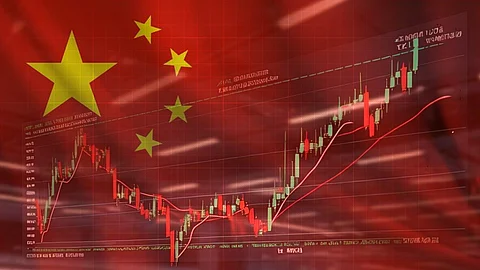

Isn't the idea of the 'European Single Market'—much celebrated as the pinnacle of free trade—actually revealing a deeper truth about capitalism? That it requires a central authority to watch and control the free movement of goods, services, capital, and even people. Beyond the social ideology imbued in liberal values and the notion of freedom, the recent fall of centrist parties and the return of the 'right-wing repressed' in major Western societies like America, France, and Germany tells us one thing clearly: capitalism without authoritarianism cannot sustain itself.
And yet, it's only 'communist capitalism'—as practiced by China—that is naturally seen as 'progress without freedom.' This model sustains paradoxes not just for Marxist ideologues but also for liberals and conservatives alike. The rise of China as a global superpower in the capitalist world reveals an unsuspected truth: it’s not capitalists but rather communists who can run capitalism much better—especially when it comes to delivering better outcomes for the working class.
No modern nation, whether in the East or the West, can deny the bigger fact: China has lifted hundreds of millions out of poverty and has been the world's primary engine of economic growth, contributing 30% of global economic growth in the last decade. China's per capita income has nearly quadrupled in the past 15 years. In 2016, China's economy surpassed the US when measured in purchasing power parity (PPP), and today, it is the biggest trading partner of most major nations.
Once considered a peripheral economy like India still is, China has flipped the global market and created its own peripheries—becoming the center, even for the Western world. What made this transformation possible? One key factor is China's state control over agricultural land. Unlike India—which opened its economy at the same time but remains shackled by caste-based inequalities in rural areas—China smoothly transitioned from an agrarian to an industrial economy. State control allowed millions of rural workers to become an urban workforce without triggering a large-scale social crisis. Meanwhile, India’s majority population remains in rural areas, bound by fragmented and caste-determined land ownership, which results in vast income inequalities across social groups. As we know, the global capitalist system operates through the center-periphery dynamic—where Western nations dominate as centers, extracting raw materials and cheap labor from peripheral regions. But China reversed this structure by transforming itself from a periphery to the center of global production. India, on the other hand, remains trapped as a periphery, with low domestic industrial production and continued dependence on Western economies.
Theories like those of Max Weber fall short when it comes to understanding capitalism in China and India. Weber famously argued that capitalism grew out of the Protestant ethic—an ideology rooted in rationality and individualism—but he failed to grasp how alternative models of capitalism could emerge outside the West. While India remains dominated by a ruling upper-caste minority that controls ideology and political power, China operates through a system where the ruling class represents the ethnic and social majority under the banner of socialist ideology. The importance of centralised authority in sustaining capitalism is not unique to China. Even the European Union—despite claiming to be a bastion of free-market democracy—relies on centralised regulatory mechanisms to manage its common market. This reinforces the argument that capitalism without authority and control cannot sustain itself.
Francis Fukuyama once proclaimed the 'end of history,' suggesting that liberal democracy and free-market capitalism represented the final stage of ideological evolution. But the internal crisis of Western capitalism and the sustained success of China's 'communist capitalism' tell a different story. Far from being an aberration, China's model suggests that capitalism may function more effectively under centralised control and planning.
In conclusion, the rise of China challenges the dominant narrative that free markets and liberal democracy are the inevitable future of human society. It reveals an uncomfortable truth: capitalism, far from being synonymous with freedom, may actually work best under the firm hand of authoritarian governance. While Western societies struggle with their contradictions and the resurgence of the far-right, China continues to reshape the global economic order. Perhaps the most unsettling thought for the champions of liberal democracy is this—'communist capitalism' may not be an exception, but the future of capitalism itself.
Dr Rahul Sonpimple is President of the All India Independent Scheduled Castes Association (AIISCA) and director of the Savitribai Phule Resource Centre (SRC) in Nagpur. He holds a Master’s degree in Dalit and Tribal Social Work from the Tata Institute of Social Sciences, Mumbai, along with MPhil and PhD degrees in Sociology from Jawaharlal Nehru University (JNU). Views expressed are the author's own.